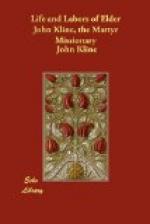Peter tells us something about this in the chapter read. He here says: “Ye were REDEEMED, not with corruptible things, with silver or gold, from your vain manner of life handed down from your fathers; but with the precious blood, as of a lamb without blemish and without spot, even the blood of Christ.... Ye have purified your souls in your obedience to the truth; ... having been begotten [or born] again, ... through the word of God, which liveth and abideth.”
He now introduces the contrast between man’s natural birth and his spiritual birth: “That which is born of the flesh is flesh; and that which is born of the Spirit is spirit;” and he says:
“All flesh is as grass,
And all the glory thereof as the flower
of grass.
The grass withereth, and the flower falleth.”
“Dust thou art, and unto dust shalt thou return,” is the doom of flesh and blood sealed to every mortal as a consequence of sin. No wonder the grave is sad and lonely to the contemplation of those who have no hope of aught of life or love beyond it. It is sad to think how many have no higher claim to life and happiness than mere fleshly, bodily existence. But our Lord hath “brought life and immortality to light,” and
“The good Spirit of the Lord
Reveals a heaven to come;
The beams of glory in his Word
Allure and guide us home.”
“Beloved, now are we the children of God, and it is not yet made manifest what we shall be;” but we know that we have the promise of “an inheritance incorruptible, and undefiled, and that fadeth not away.”
Brethren, this inheritance which Peter talks of—what do you think about it? Is it something extraneous to the man, something outside of him? Or is it something intrinsic to the man in his renewed state, something internal, something inside of him? I, for one, believe that man’s eternal and blissful inheritance, which Peter and John and Paul describe in such glowing terms, is in the man himself, in his adaptation to the bliss-inspiring garniture of heaven. It is “Christ in him the hope of glory.”
This exalted and blissful state of man redeemed is what Peter calls his “inheritance which is incorruptible.” Think of it, Brethren. No more sin to bewail; no more sickness to suffer; no more death to dread! It is also “undefiled.” No more “filthiness of the flesh;” “neither idolatry, nor adultery, nor whatsoever loveth and maketh a lie.” And “that fadeth not away.” The luster of the eye; the bloom of the cheek; the facial expressions of beauty and love, purity and truth, know nothing of decay in the amaranthine bowers of spotless purity.




